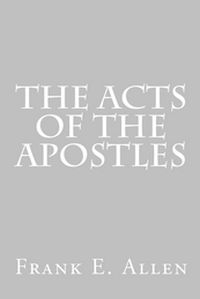ICC NT Commentary
ICC NT Commentary is an “academic-level commentary” focusing on linguistic, textual, archaeological, historical, literary, and theological considerations.
Brief from Wikipedia.org
The International Critical Commentary (or ICC) is a series of commentaries in English on the text of the Old Testament and New Testament. It is currently published by T&T Clark, now an imprint of Bloomsbury Publishing.
Initially started over one hundred years ago, the International Critical Commentary series has been a highly regarded academic-level commentary on the Bible. It aims to marshal all available aids to exegesis: linguistic, textual, archaeological, historical, literary and theological. No unifying scheme is sought, but each scholar has been free to express their expertise.[1][2]

Ritchie Foundational Truths of the Gospel is a basic doctrinal treatise for Assurance, Conversion, Eternal Life, Judgment, Justification, Perfection, Regeneration, Salvation, Sanctification, and Separation.
PDF:Ritchie Foundational Truths of the Gospel
theWord:Ritchie Foundational Truths of the Gospel
eSword:Ritchie Foundational Truths of the Gospel
MySword:Ritchie Foundational Truths of the Gospel
Originally edited by Samuel Rolles Driver, Alfred A. Plummer and Charles Augustus Briggs (whom the Presbyterian Church in the USA excommunicated for heretical views on Scripture), the series has been in the hands of various editors since. The current editors are Stuart Weeks and Christopher M. Tuckett.
Download
Download “ICCNT.cmt.twm” ICCNT.cmt.twm – Downloaded 378 times – 27.83 MBICC NT Commentary
More New Testament Commentaries
- 30+ Commentaries on Romans
- Abbott-Abbott-Illustrated New Testament.cmt.twm
- Abbott, T.K. – Ephesians Colossians Commentary
- Alexander Epistles of John Commentary
- Alexander Expositor’s Bible Vol 48 Epistles of St. John
- Allen – Commentary on Matthew
- Allen Commentary on Acts
- Allusions in the New Testament in the ANF
- Amplified Bible Commentary (updated)
- Anderson – Types in Hebrews
Advertisement
Using theWord Module layout Sets theWord does not just read the particular modules (books) you have in its folder. These books must be registered and added to a "Module Layout Set", which one of these must be chosen. So you can separate, slice and dice your library as you wish, or put them all into a single library. But the module may be invisible if you do not correctly set this up on adding a new module. This class explains all of how to do this.
